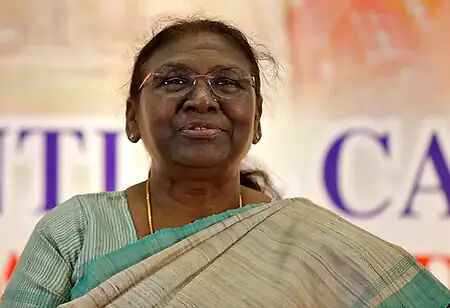
Droupadi Murmu: Scripts History as the Country's First Tribal President


The exponential use of technology in governance has been an iconic achievement of the government headed by PM Narendra Modi. It opened a wide doorway to socio-economic developments across the marginalized segments of the society, which otherwise looked impossible. The government has made Digital India, which once seemed an unrealistic dream, the face of new India through its elaborated schemes, which benefits people from nooks and corners of the country.
Notably, long before asking the people for an attitudinal change, the Modi government lounged its confidence in women’s power in multiple ways. The PM has convinced the country that women can effectively play leadership roles.
In Gujarat, when he was the Chief Minister, he made it a point to give women the charge of village water distribution committees. But even then, the gesture was a justice that came late. How? Let's wind back seven decades.
On December 19, 1946, while speaking at the Constituent Assembly, Adivasi leader Jaipal Munda proposed a new constitution. "As an opportunity for my people who have suffered for 6,000 years,” he said. On January 24, 1947, Munda structured the Advisory Committee tasked with preparing schemes for the administration of tribal areas; it never occurred to those responsible for selecting the committee to have a tribal woman on it. After 75 years, now NDA Presidential candidate Droupadi Murmu has scripted history by becoming the country’s first tribal President defeating opposition nominee Yashwant Sinha.
All about First Adivasi President
Droupadi was born in a Santali family on June 20, 1958, in the Baidaposi area of Rairangpur, Odisha. Her father and grandfather were traditional heads of the village council. An arts graduate of Rama Devi Women's College, she is a follower of the Brahma Kumaris spiritual movement. After her education, she married a banker with whom she had two sons and a daughter. Her husband, two sons, mother, and brother all died in a span of seven years, from 2009 to 2015.
Early Life and Political Career
From 1979 to 1983, Droupadi worked as a junior assistant at the irrigation department of the Government of Odisha. It was followed by her tenure as a teacher at the Sri Aurobindo Integral Education Centre, Rairangpur. Droupadi taught Hindi, Odia, Maths, and Geography.
In 1997, she joined the Bharatiya Janata Party (BJP) in Rairangpur and was elected as the councillor of the Rairangpur Nagar Panchayat in the same year. Droupadi served two terms in the Odisha Legislative Assembly between 2000 and 2009. She was the Minister of State with Independent Charge for Commerce and Transportation and Fisheries and Animal Resources Development when Odisha had the BJP and BJD federation government. But Droupadi lost the Lok Sabha election in 2009.
In 2015, she was elected as the Governor of Jharkhand and became the first woman to hold the position. BJP ruled Jharkhand for most of her six-year tenure as a governor and was also in power in the Union Government throughout her tenure.
Pathalgadi Movement and Murmu’s Work for Tribal Community
In May 2016, the central government introduced two ordinances that enabled the transfer of tribal land to the government for commercial purposes. Following this, the Pathalgadi movement was started by tribals in the Khunti district of Jharkhand as a resistance movement to claim rights, including the right to sovereign territory.
Pathalgadi is the reflection of carving a stone. The tribals carved orders on the stones, such as restricting outsiders' entry. During the Pathalgadi movement, protests were held against amendments to the tenancy Act. After a few days, the protest turned violent, and the tribals abducted the security detail of the BJP Member of Parliament Karia Munda. The police department was not at all in control of the situation. They responded violently to tribal communities that caused the death of a tribal man. That led to criminal cases against more than 200 people, including the tribal rights activist Stan Swamy. At the time, Murmu was criticized for her soft stand on police aggression against tribal communities during the movement.
Ratan Tirkey, a former BJP politician and activist, says, “Murmu had not done enough to make sure that the self-governance rights granted to tribal communities were properly implemented. These rights were granted under the Fifth Schedule and the Panchayats Act, 1996 or PESA. Despite several requests, the then governor never exercised her powers to implement the Fifth Schedule provisions and Pesa in letter and spirit.”
But the following years proved her stand, and she came out strong in the end. Murmu refused to receive the bills, and in 2017 the government withdrew the bill.
In June this year, the BJP nominated Murmu as the National Democratic Alliance (NDA)'s candidate for President of India for the 2022 election the following month. Yashwant Sinha was nominated as the candidate for President by the opposition parties. Murmu visited various states seeking support for her candidature during her campaign. Several opposition parties also supported her candidature while polling, including cross-voting from different opposition party leaders. On July 21, 2022, Murmu got a clear majority in the Presidential election by leading 676,803 electoral votes in 21 of the 28 states to become the 15th President of India and the first one from the tribal ethnicity.